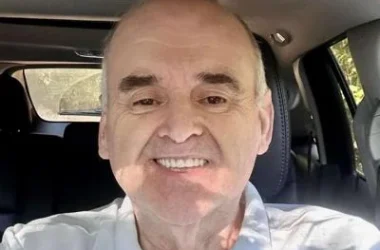By JIM McCONVILLE
The Journal
HAGERSTOWN, Md. — “Please, arrest my daughter — I want to get her clean.”
The plea came from a police officer to fellow officers making up a drug task force when he had run out of options to solve his daughter’s heroin addiction, according to David Shields, special agent for the U.S. Drug Enforcement Agency’s Hagerstown office.
Shields spoke to a roomful of officers and state legislators from four states — Maryland, Pennsylvania, Virginia and West Virginia — at the 28th Quad State Legislative Conference was held at the University of Maryland’s Hagerstown satellite campus Thursday.
“They were able to arrest her, and good for his mind’s sake,” Shields said. “She was free for a while, but unfortunately she went back out there.”
Clean for a week, the daughter eventually sneaked out of the of family home in the middle of the night, Shields said. A day later, police found her body in the back of her car in the church parking lot.
“This affects everybody,” Shields said.
Each year state legislators from the four neighboring states convene to discuss critical issues and share policy initiatives. This year, the conference first topic was titled “Opioid Crisis Along the I-81 Corridor.” The presentation was to provide the latest law enforcement data and offer legislators the chance to ask questions.
According to Shields, the first step to addiction can frequently start at home in the form of a pain medication prescription written by a family doctor.
“These people start their addiction right out of the medicine cabinet,” Shields said.
Having worked the drug war front lines with the DEA for 21 years, Shields understands the enforcement side. However, education is what Shields sees as the most important component to beef up for the drug battle, suggesting drug education be expanded in public schools.
“I think that we’re really missing the education — I don’t know if we’re getting the message out to the educators,” Shields said. “If we’re not dealing with it at the kids level. This problem is here to stay we got to get the message out. We’ve got o talk to these kids and we’ve got to talk to them early — it’s in all the schools.”
West Virginia Del. John Overington, (R- Berkeley), asked a panel of police officers whether they feel they’re winning or losing the war against drugs.
Paul Kifer, captain of the Hagerstown Police Department replied “we are treading water.”
Another casualty in the war against drugs: children of addicted parents, according to Maryland State Sen. Andrew Serafini.
“We have anywhere between four to six out of 10 babies that are being born drug addicted,” Serafini said. “These are people in their 20’s and 30’s — these are crack babies of the 1980s and1990s that have had enough — it’s really a traumatic brain injury.”
According to Serafini, the addicted baby count wiull only rise.
“You’ve got to know that there’s a tsunami coming,” Serafini said. “We talk about cutting this off. If we don’t cut off these babies being born that are drug addicted. We have expulsions of kindergarteners.”
According to Serafini, an effective drug addiction program needs to attack the problem on multiple fronts.
“We’ve got to address the psych side of addiction; we’ve got address the need for beds; and we’ve got to figure this (insurance) funding thing out,” Sara Serafini said.
In tandem with a rising tide of drug addicted children, W.Va. Sen. Patricia Ruckers (R-Jefferson), said there’s another drug related problem.
“We don’t have enough families to take over these children of all the drug addicted parents,” Ruckers said.
Staff writer Jim McConville can be reached at 304-263-8931, ext. 215, or Twitter@jmcconvilleJN.
See more from The Journal





